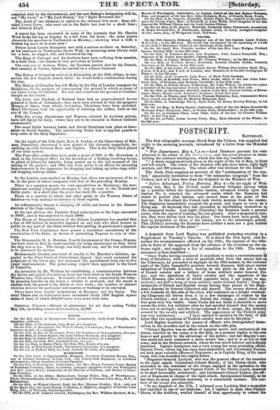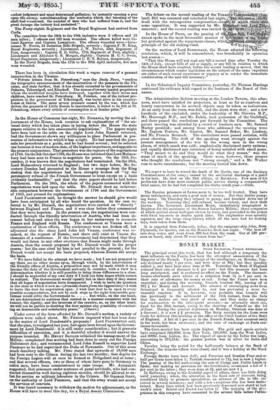POSTSCRIPT.
SATURDAY.
The first telegraphic message direct from the Crimea Was supplied last night to the morning journals, introduced by a letter from the Minister of War.
" War _Department, May 4, 7 p. tn.—Lord Panmure presents his com- pliments to the editor of the -- and has great pleasure in trans- mitting the enclosed intelligence, which him this day reached him.
" A sharp engagement took place on the night of the 1st of May, in front and left attack. The whole of the Russian rifle-pits were taken, eight light mortars, and 200 prisoners. The whole affair was brilliant for the Allies. "
The Daily _Yews supplies an account of the "continuation of the con- test," apparently forwarded to them "by submarine telegraph" from the Crimea, and of a later date than the despatch to the Minister of War.
" Before Sebastopol, Friday _Morning, May 4.—On the night of Wed- nesday last, May 2, the French under General Pelissier having taken up a position before the Quarantine bastion, advanced briskly upon the bastion No. 4, attacked the advanced works which the Russians had raised to protect that bastion, and carried them at the point of the bayonet. In this attack the French took twelve mortars from the enemy. The Engineers immediately occupied the ground, and began to carry on a flying sap. At daybreak they had succeeded in establishing themselves in the conquered works. Last night (Thursday) the Russians made a general sortie, with the object of retaking the lost ground. After a sanguinary com. bat, they were driven back into the place. Our losses have been great, but bear no proportion to those of the enemy, nor to the advantages gained. This (Friday) morning the Russians have neither a man nor a gun outside the regular enclosure of the place."
A despatch from Lord Raglan was published yesterday evening in a Supplement to Tuesday's Gazette. It is dated the 21st April, and de- scribes the reconnaissance effected on the 19th; the capture of the rifle- pits in front of the approach from the advance of the trenches on the ex- treme right ; and supplies a list of casualties to the 19th. The recon- naissance is thus described-
" Omar Pasha having considered it expedient to make a reconnaissance ill front of Balaklava, with a view to ascertain what force the enemy had on the Tchernaya, he proceeded at daylight on the 19th instant, by the extreme right of Sir Colin Campbell's position, towards Kamera, with about twelve battalions of Turkish infantry, having in the plain on his left a body of French cavalry and a battery of horse artillery under General Foe ray, and two squadrons of heavy cavalry and two squadrons of the Tenth Hussars, (the whole of which regiment have I am happy to say, arrived,) and half a troop of horse artillery under Colonel Parlby ; these de- tachments of French mid English troops having been placed at his High- ness's disposal by General Canrobert and myself. The enemy showed only a few Cossacks on this side of the river, who remained on a height overlook- ing Chagouria till driven from it by a few discharges of rockets by the French artillery ; and on the side, behind the village, a small force with four guns only was visible. Omar Pasha did not think it desirable to move across the river, but withdrew after he had satisfied himself that the enemy were not in strength; and the troops returned to their camps, the infantry covered by the cavalry and artillery. The appearance of the Turkish army
was very satisfactory I have omitted to mention in the body of thin. letter that two squadrons of Turkish cavalry were also in the plain.' Lord Raglan mentions the names of officers who distinguished them. selves in the trenches and in the attack on the rifle-pits.
" Colonel Egerton was an officer of superior merit, and conducted all his duties, whether in the camp or in the field, in a manner highly to his own honour and greatly to the advantage of the public; and her Majesty's ser- vice could not have sustained a more severe loss ; and it is so felt in this army, and in the Seventy-seventh, where he was much beloved and is deeply lamented. Captain Lempriere was a very young but most promising officer. Captain Owen, whose leg has since been amputated, and Lieutenant Baynes, are both most valuable officers of Engineers; as is Captain King, of the same corps who was wounded two nights before. "Brigadier-General Lockyer, who was the general officer of the trenches in the right attack, Lieutenant-Colonel Mundy, of the Thirty-third, who succeeded to the command of the troops engaged in the operation on the death of Colonel Egerton, and Captain Gwilt, of the Thirty-fourth, deserved to be most favourably mentioned ; and Lieutenant-Colonel Tylden the offi- cers of Engineers in charge of the right attack, distinguished himself, ash. has done on many previous occasions, in a remarkable manner. The cons duct of the troops was admirable.
"In my despatch of the 17th, I informed your Lordship that a magazine had exploded in one of our batteries; but I omitted to state that Captain Dixon, of the Artillery, availed himself of that opportunity to evince the coolest judgment and most determined gallantry, by instantly opening a gun' upon the enemy, notwithstanding the confusion which the bursting of the shell had occasioned, the number of men who had suffered from it, and the great damage the battery had sustained."
The Forty-eighth Regiment and the Royal Regiment had arrived front Corfu.
The casualties from the 16th to the 19th inclusive were 2 officers and 22 men killed ; 7 officers and 102 men wounded. The officers killed were Co- lonel Egerton and Captain Lempriere. The officers wounded were—Lieu- tenant W. Norris, 2r1 Battalion Rifle Brigade, severely ; Captain F. W. King, Royal Engineers, severely.; lieutenant J. W. Trevor, 55th Regiment of Foot, dangerously; Captain B. D. Colby, 77th Regiment of Foot, slightly ; Lieutenant and Adjutant G. B. Morgan, slightly ; Captain H. C. C. Owen, Royal Engineers, dangerously ; Lieutenant C. E: S. Baynes, dangerously.
In the Naval Brigade, from the 17th to the 20th April inclusive, five men were wounded.



































 Previous page
Previous page